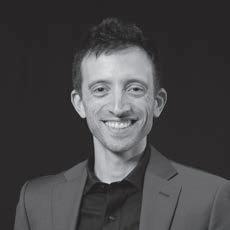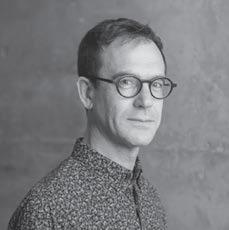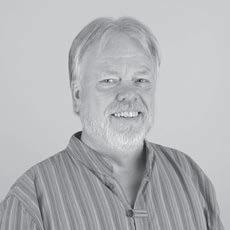CHAMBER AND SOLO WORKS BY
c Music Composition Faculty
Preformers are listed inside.
Wednesday, October 15, 2025
7:30 pm
Recital Hall
Philadelphia (2025) Andrew Conklin (b. 1984)
Filo Ebid, voice
Eric Dudley, piano
Pre-recorded audio
Brittany Trotter, flute
Jonathan Latta, percussion
Kyle Bruckmann (b. 1971)
Pre-recorded video
Christopher Burns (b. 1973)
15, 2025, 7:30 PM
Turn: Six Rumi Poems (2023)
A Secret Turning in Us
Say I am You
Birdsong Brings Relief
March
Drumsound Rises on the Air
Flutes for Dancing
Heidi Moss Erickson, soprano
Brittany Trotter, flute
Kathryn Schulmeister, double bass
Jonathan Latta, percussion
PROGRAM NOTES
Conklin: Philadelphia
On May 17, 1838, a mob in Philadelphia set fire to Pennsylvania Hall while abolitionists were meeting inside. Just three days earlier, the enormously popular Philadelphia bandleader, Francis “Frank” Johnson, returned home from a triumphant trip to Europe. Johnson, a highly successful composer and publisher of cotillions, quadrilles, and other dance tunes, was a prominent member of Philadelphia’s black political and cultural elite that had been flourishing in the city since Pennsylvania abolished slavery in 1780. The attack on Pennsylvania Hall would not have been the first time Johnson witnessed the contradictions between his city’s racial violence and his personal status as a beloved musical figure. This short song imagines Johnson’s internal monologue at this moment in his remarkable life.
Bruckmann: Predictable Epiphanies
In 2015, I began diving into the poetry of my friend Matt Shears. As he fed me drafts of Dear Everyone (published in December 2016 through Brooklyn Arts Press), I fell in love with the maddeningly recursive structures, the obsessive rhythm, and the all-around serious play of his writing. But I loved just as much the fact that he's my friend, and a friend who does something as esoteric and weird with words as I do with sounds—something that I likely would never have encountered at all were we not otherwise friends.
Over the course of many months, I enlisted the indulgence of nearly 100 other friends, musical colleagues, and family members (including both Matt’s and my then-elementary-school-aged daughters), shoving crumpled pieces of paper into their hands and a microphone into their faces. By putting Matt's words into other people’s mouths, I'm cheekily asserting the non-irrelevance of experimental art. By prioritizing awkward, spontaneous, and distinctly non-professional “poetry reading,” I found in the varied interpretations, speech errors and accents an amped-up expression of the multiplicity already inherent in the text, and a great joy in the diverse musicality of my community’s voices.
Goaded by that multiplicity and by the poem’s epic sprawl, I resolved to make my“Dear Everyone” a modular work with no single possibly definitive form. One distinct realization was a program-length concert featuring my quartet Degradient in 2016 at the Lab in SF; another was a double album released by the Polish label Not Two that same year; another still is this short “tape piece,” first presented in 8-channel diffusion in January 2017 at the San Francisco Tape Music Festival.
PROGRAM NOTES
Conklin: Advanced Metrics
Advanced metrics are modern statistical methods of analyzing the performance of professional athletes. Like athletes at their peak, the musicians in this piece must make quick and coordinated pivots on a dime, shifting abruptly between balletic grace and blunt force. This piece was composed for—and in joyful collaboration with—my two wonderful colleagues Brittany Trotter and Jonathan Latta.
Bruckmann: color x theory x practice
In 2021, I collaboratively created the video piece Hide Self, View with my old friend and frequent collaborator Chris Burns, who had recently added to his evil-genius skill set (as a composer, guitarist and electronic musician) some bracing work with algorithmically driven digital video editing. Giddy from that process (and still anxiously stuck at home due to the pandemic), it struck me as a “good” idea to stockpile more video fragments for potential future use. My daughter was feeling rather grown up and wanted to re-paint her room; I realized that quickly capturing before- and after-footage would provide an unlikely number of different monochrome walls throughout our home. I collected a pile of solid-colored t-shirts and a sequence of oboe multiphonics and got to work, dreaming of Chris’s coding enabling a matrix of permutations far more rigorous than I would possibly have the patience to assemble on my own. The resulting files languished in our hard drives until I visited Chris in Philadelphia during a short northeastern tour this past summer; now you’re being subjected to the premiere. Enjoy?
Wood: Turn: Six Rumi Poems
With the uncertain and challenging times we have all experienced in the past decade, the decision to write a musical setting of the poetry of a thirteenth century mystic poet may seem a strange choice and perhaps a little removed and out of touch. Art is supposed to be challenging and speak truth to power. Art shouldn’t retreat in the face of challenges. Dredging up ancient words and putting them in the mouth of a singer may seem indulgent and esoteric at best.
In the summer of 2023, however, I found the poetry of Rumi to be somehow transcendent. The timeless and universal nature of these poems connected with the essence of what it is to be human. Here was a voice from 800 years earlier and half a world away celebrating the beauty and vulnerability of
nature, the simple joy of movement, dance and music and the doubting of his own significance and purpose. That reminder of the basics of the human condition seemed to be the balm I needed to move forward. This, too, is what Art can be.
Structurally, the cycle consists of three short poems alternating with three longer ones. The shorter poems each feature the soprano and one of the instrumentalists while the longer poems incorporate the entire ensemble.
Turn: Six Rumi Poems
Translations by Coleman Barks
A Secret Turning in Us
A secret turning in us Makes the universe turn. Head unaware of feet, and feet head. Neither cares. They keep turning.
Say I Am You
I am dust particles in sunlight. I am the round sun.
To the bits of dust I say, Stay. To the sun, Keep moving.
I am morning mist, and the breathing of evening.
I am wind in the top of a grove, and surf on the cliff.
Mast, rudder, helmsman, and keel, I am also the coral reef they founder on.
I am a tree with a trained parrot in its branches. Silence, thought, and voice.
PROGRAM NOTES
The musical air coming through a flute, a spark off a stone, a flickering in metal. Both candle, and the moth crazy around it.
Rose, and the nightingale Lost in the fragrance.
I am all orders of being, the circling galaxy, the evolutionary intelligence, the lift, and the falling away. What is and what isn’t. You who know
Jelaluddin, You the one in all, say who
I am. Say I am you.
Birdsong Brings Relief
Birdsong brings relief to my longing.
I am just as ecstatic as they are, but with nothing to say!
Please, universal soul, practice some song, or something, through me!
PROGRAM NOTES
March
Again, the sharp new moon blade. Again, we walk a garden with the lily’s clever talking around us.
Green satin no tailor sews, trees putting on their hats.
A drumming begins, and we play along on the drums of our stomachs.
The lake that was ice and iron is now ridged in the breeze like David’s chainmail,
A voice says to the herbs, Raise up. The mystic crane returns.
The humiliated ones dress and show their heads in windows again.
There’s a public concert on the tomb of January. The willow shakes its head
I have something to say to language, Leave me alone,
But language chases after me, arguing. I don’t want to talk anymore With the air so bathed in green light.
Those we thought were lost are back. Resurrection is decay, then re-creation. How the sun is with plants is evidence enough.
Live here where souls do what they do, enjoy union, play the part of Pharaoh, or speak to each other in silence.
PROGRAM NOTES
Drumsound Rises on the Air
Drumsound rises on the air, Its throb, my heart.
A voice inside the beat says, “I know you’re tired, but come. This is the way.”
Flutes for Dancing
It’s lucky to hear the flutes for dancing coming down the road. The ground is glowing. The table set in the yard.
We will drink all this wine tonight Because it’s Spring. It is. It’s a growing sea. We’re clouds over the sea, or flecks of matter in the ocean when the ocean seems lit from within. I know I’m drunk when I start this ocean talk.
Would you like to see the moon split In half with one throw?
Andrew Conklin is an associate professor and program director for composition and musicianship at University of the Pacific. He creates music that traverses American vernacular idioms and contemporary classical practices.
A Grammy Award-nominated musician, Conklin has performed throughout the United States and Europe as a guitarist and bassist with indie rock bands, bluegrass groups, and improvising ensembles. He has enjoyed fruitful partnerships with musicians from some of today's most inquisitive new music ensembles, including the International Contemporary Ensemble, Yarn/ Wire, Ensemble Mise-En, Spektral Quartet, Calidore String Quartet, Hub New Music, and Earplay. His albums are released on New Focus Recordings and Bot Cave Records.

Kyle Bruckmann is an assistant professor of practice in oboe and program director of varied ensembles at University of the Pacific.
Bruckmanns creative output as an improviser and composer/performer extends from conservatorytrained foundations into gray areas encompassing free jazz, post-punk rock, and the noise underground. He creates solo, small ensemble, and fixed media works for acoustic and electro-acoustic instrumentation, foregrounding collaboration, generative processes and intuitive, modular forms. While he writes primarily for himself and the “creative music” ensembles he leads (such as Wrack and Degradient), Bruckmann has also composed for performers including sfSoundGroup, bassoonist Dana Jessen, and Earplay.

Eric Wood is an associate professor of practice in theory and composition at University of the Pacific. He has been a faculty member at the Conservatory of Music since 1998 teaching a variety of courses in both music history and music theory as well as applied composition lessons. His recent compositions include Turn: six Rumi poems, Elgin Movements for piano trio, and Itzsnotta Sonata for violin and two percussionists.

Wood holds a Bachelor of Music and Master of Music in composition from the University of Oregon where his primary teachers were Derek Healey, Harold Owen, and Monte Tubb. He earned a Doctorate of Musical Arts in composition from Boston University, studying with Charles Fussell and Lukas Foss.
Every gift to the Conservatory from an alum, parent, or friend makes an impact on our students. Our students rely on your generosity to enable them to experience a superior education.
Please contact the Assistant Dean for Development at 209.932.2978 to make a gift today. You may also send a check payable to University of the Pacific: Conservatory of Music, University of the Pacific Attn: Assistant Dean for Development 3601 Pacific Avenue Stockton, CA 95211




To view our upcoming events, scan the QR code or visit Pacific.edu/MusicEvents
